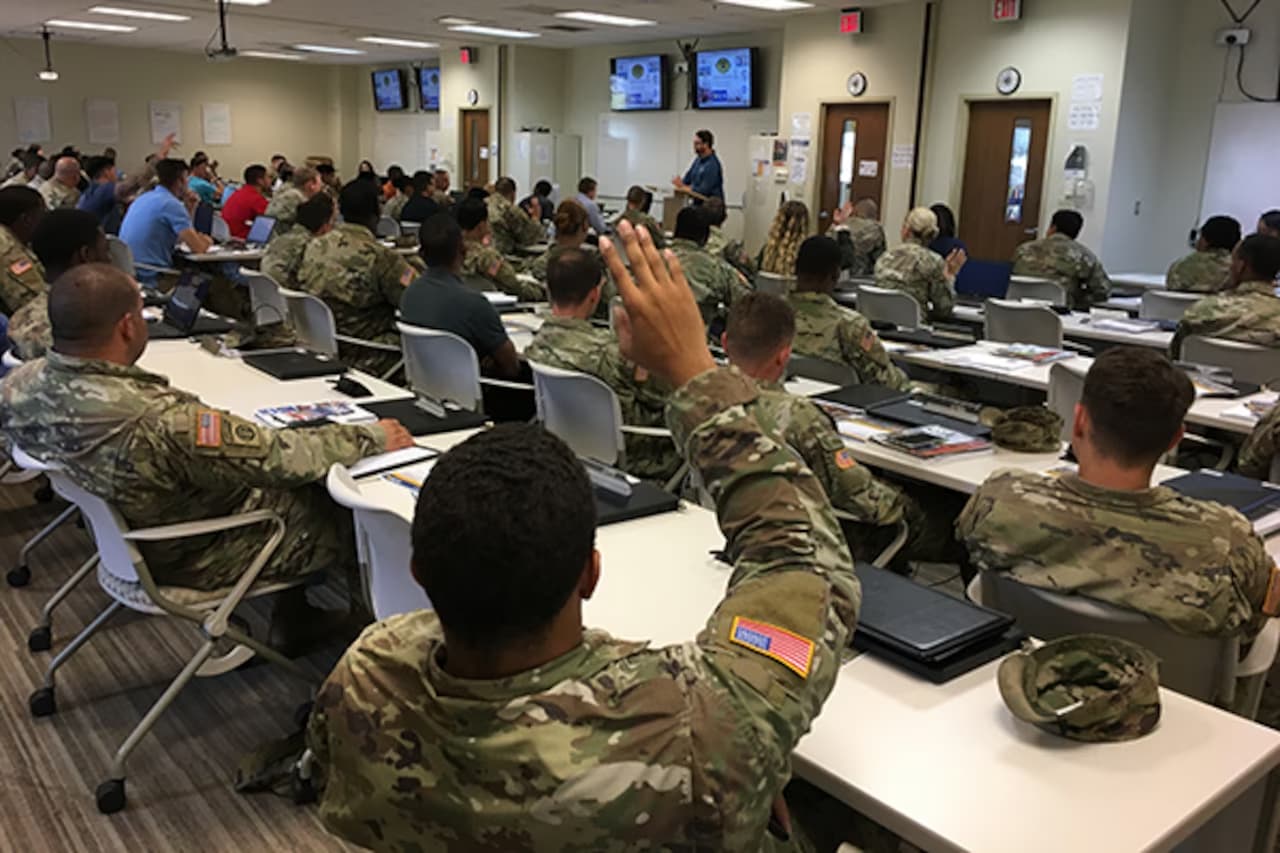The Army Transition Assistance Program (TAP) provides information, tools, and training to ensure service members leave active duty ready for civilian life. Whether pursuing additional education, finding a job in the private sector, or starting a business, TAP helps service members achieve their career goals and objectives.
The process is broken down into five parts over a minimum 12-month timeline, although those getting ready to retire can start as far ahead of time as 24 months.
The Army Transition Assistance Program, or TAP, is a military-to-civilian transition service that provides information and support for Service members who will be leaving active duty or retiring from the Army. It is administered by the Department of Defense with the support of other agencies, such as the Departments of Labor, Education, Homeland Security, Veterans Affairs, and Small Business Administration.
The TAP program helps service members prepare for post-military life by providing counseling pathways and various resources. It also helps mitigate the adjustment costs that may result from losing military benefits, such as health care, housing, or child care, to the more typical civilian benefits that are available in the private sector.
During the TAP process, Service members begin by meeting with a counselor and completing a self-assessment to identify their needs and develop an Individual Transition Plan (ITP). This one-on-one counseling session must start no later than 365 days before their anticipated separation or retirement date.
Counseling is designed to help service members make decisions about their career options, prepare for a job search and reenter the workforce, or seek higher education. It also helps them register for benefits, attend VA benefits briefings and DoL employment workshop briefings, complete a 12-month post-separation financial plan, and apply for a job.
There are also several classroom-based and virtual TAP tracks to choose from. These include the DOL Employment Track: Employment Workshop, DOL Vocational Track: Career Credential and Exploration, DOD Education Track: Managing Your Education, and the Small Business Administration Entrepreneurship Track: Boots to Business.
The military-to-civilian transition has a wide range of impacts for all involved, including the Service member, their family, and the local community. The effect is varied based on many factors, including the member’s age, health, disability, education, and readiness level.
As the Army has learned, it is critical to have an effective transition process that reduces the stress of separation for Soldiers. Fortunately, the Army is working to fix some of the issues highlighted by the watchdog group Government Accountability Office. Specifically, the Army is adding more time to courses to give Soldiers the time they need to complete their classes.
What is Army TAP Online?

The Army Transition Assistance Program (TAP) is a multi-faceted program designed to help soldiers, veterans, National Guard and Reserve members, and their family members transition from the military. This includes providing information and training about the services, benefits, and resources available to service members during their transition from active duty.
TAP is a required separation component for all Soldiers with at least 180 continuous days of service and who are scheduled to separate from the Army. It is also recommended for retirees and military spouses.
As part of the program, each Soldier must complete a self-assessment and an individual individualized initial counseling session at least 365 days prior to their official separation date. This process is intended to allow the service member to develop a transition plan and a chance to receive some initial guidance on how to move forward with their transition.
The counselor will create an individual transition plan and pre-separation counseling checklist during this initial session. This is a very important step because it will be used to verify that the service member has completed all the requirements of TAP and has a viable ITP.
The next step in the TAP process is a one-day brief called Employment Fundamentals for Career Transition conducted by the Department of Labor. The class is a mandatory part of the TAP program and is designed to help service members prepare for civilian employment.
It is an interesting class and one that is particularly beneficial for those looking to pursue a professional career after leaving the military. The lesson highlights the importance of developing a sound work ethic and leveraging your previous military skills for success in the civilian world.
This class is only a half day long, but it is a must for all service members planning to leave the military. This is because it is one of the few opportunities that will allow you to align your military skills with those of the civilian job market.
What does Army TAP do?
The Army Transition Assistance Program (TAP) provides information and training for separating/retiring service members, Department of the Army civilians, Department of Defense retirees, Soldiers’ family members, and caregivers transitioning into civilian life. TAP is administered locally at TAP Centers or via the Army’s 24/7 Virtual Center if a TAP center is more than 50 miles away from your location.
TAP consists of three mandatory components: Pre-Separation Counseling, the Transition Seminar, and optional two-day career tracks. These components are required for all separating and retiring Service Members who have at least 180 days or more on active duty; this includes National Guard and Reserve serving on Title 10 status.
In addition to these mandatory components, TAP provides transitioning military members with the resources and guidance they need to successfully reenter the civilian workforce, pursue additional education or technical training, or start a small business. This helps ensure a smooth and productive transition for Service members.
These resources are delivered by a multi-disciplinary team of interagency partners across 206 military installations worldwide. These partners deliver the Transition GPS curriculum and one-on-one services to help transitioning Service members achieve their military career goals.
During the transition process, separating/retiring service members are encouraged to identify their unique transition goals and develop a personal Individual Transition Plan (ITP). They are also provided with resources and tools that can help them overcome obstacles they may encounter.

For example, the transitioning service member will learn how to identify a target job or career field, evaluate their skills and experience, develop a resume, and prepare for a first interview. In this way, they can find the job that best fits their needs.
The redesigned TAP incorporates new strategies to support a seamless transition from military to civilian life. It is based on a reconceptualized model called the “Success in Transition” or “SIT” model and is designed to address the critical issues associated with the military-to-civilian transition.
A successful transition requires a holistic approach that addresses the physical, psychological, social, and economic aspects of the transitioning Service member’s journey from military to civilian life. For instance, the transitioning service member may need to adapt to their loss of military culture and camaraderie and to a restructured system of rules and guidelines for living. In addition, they need to re-establish a sense of purpose and identity.
How long is Army tap?
The Army Transition Assistance Program (TAP) is a commander’s responsibility that provides support for Soldiers, Department of the Army civilian employees, and their family members who are planning to transition from active duty. Whether you’re seeking additional education, finding a job, or starting a business, TAP can help.
The first step in the TAP process is Individualized Initial Counseling, which must start no later than 365 days before the service member’s official separation date and is conducted by a TAP counselor in-person or via video conference. During the counseling session, service members develop their Individual Transition Plan to identify their unique needs and post-transition goals.
After the IIC, service members must complete Pre-Separation Counseling which is mandatory for all eligible transitioning service members and includes by-law information like benefits, entitlements, and resources. Caregivers and spouses are encouraged to attend as well.
Once service members have completed the counseling, they are able to schedule their first TAP service. This is where they’ll meet their TAP counselor, complete a self-assessment and fill out DD Form 2648.
TAP also offers five days of classes that can be taken either in-person or online. These include the DOL Employment Track: Employment Workshop, DOL Vocational Track: Career Credential and Exploration, DOD Education Track: Managing Your Education, and the Small Business Administration Entrepreneurship Track: Boots to Business.
These classes are a great way to learn more about the job search process, networking, and entrepreneurship. You’ll also be able to meet other veterans who have left the military and are looking for a career change.
According to Hiring Our Heroes, if a Soldier begins the TAP process at least six months before they separate from the Army, they are two times more likely to get a job before they leave. However, if you wait to start your TAP work until the last minute, getting everything done on time can be harder.
TAP is designed to give Soldiers the best chance at a successful transition from military life. As such, it’s important that service members begin the process as soon as possible and take advantage of all the services available to them.
